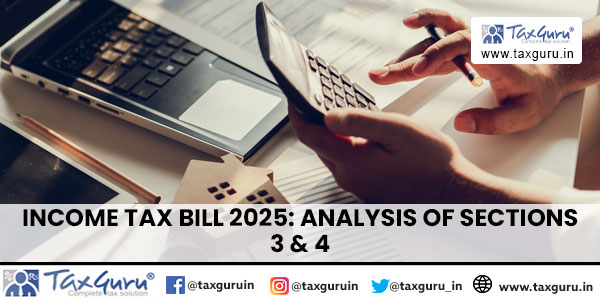Summary: The New Income Tax Bill 2025, effective from April 1, 2026, introduces key changes aimed at simplifying tax-related terms and procedures. Section 3 defines the “tax year” as a twelve-month period aligned with the financial year starting April 1, replacing the terms “previous year” and “assessment year” used in the Income-tax Act, 1961. This shift aims to reduce confusion and make tax reporting more straightforward. For businesses or income sources established during the financial year, the tax year begins on the setup or income start date and ends on the financial year’s last day. Section 4 outlines the basis of income tax charges, which are now levied on the total income of the tax year at rates specified by a Central Act. This section also clarifies that income tax may include additional taxes as stipulated, and provisions for tax deduction at source or advance payment are retained. By eliminating the terms “previous year” and “assessment year,” the bill streamlines the tax structure, ensuring that all references pertain to the tax year. These changes aim to provide clarity and uniformity in tax administration. Further details on additional sections of the bill will follow in upcoming articles.

Section 3- Definition of tax year-
(i) For the purposes of this Act, “tax year” means the twelve months period of the financial year commencing on the 1st April.
(2) In the case of a business or profession newly set up, or a source of income newly coming into existence in any financial year, the tax year shall be the period beginning with— (a) the date of setting up of such business or profession; or (b) the date on which such source of income newly comes into existence, and, ending with the said financial year.
Analysis: A ‘tax year’ is a period of twelve months contained in a financial year. It replaces the term ‘previous year’ used in the Income-tax Act, 1961, Earlier terms used – ‘’previous year ‘’ and ‘’assessment year’’ were creating confusion in minds of common man so now everyone can understand tax year…period of 12 months…simple and best ..and also need of hour..
When a business is newly set up during any financial year, or a source of income comes into existence during a financial year. In such cases, the tax year will begin from the date of setting up of the business or the source of income coming into existence, and end on the last day of that financial year.
Section 4- Basis of charge
4. (1) Income-tax for any tax year shall be charged as per the provisions of this Act at the rate or rates which are enacted by a Central Act for such tax year.
(2) The charge of income-tax under sub-section (1) shall be on the total income of the tax year of every person as per the provisions of this Act.
(3) Income-tax shall also include any additional income-tax, by whatever name called, levied under this Act.
(4) If this Act provides that income-tax is to be charged in respect of income of a period other than the tax year, it shall be charged accordingly.
(5) For the income chargeable under sub-section (2), income-tax shall be deducted or collected at source or paid in advance as provided under this Act.
Analysis: In the Income-tax Act, 1961, the charge of income-tax was on ‘total income’ of the ‘previous year’ of a person. Further, income-tax is charged for an ‘assessment year’ at the rate or rates provided by a Central Act. In the Income-tax Bill, in place of the term ‘previous year’, the term ‘tax year’ has been used. Further, the use of term ‘assessment year’ has been discontinued. Now, the total income also pertains to a ‘tax year’ and the rate or rates of income tax also pertain to that ‘tax year’. So previous year and assessment year terms have been done away with.





